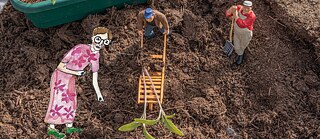CSA and Solawi are acronyms for an idea that has plenty of potential to make farming more sustainable. Granny Trude is thrilled – and she explains how it works.
My Dears,I’m shocked and speechless about the war in Ukraine. So my monthly letter to you serves as a welcome distraction for me: for once I’m not thinking about the many refugees from Ukraine who’ve made it out of the country – even all the way to the Bavarian city of Augsburg. I sure hope this madness is over soon! This is what I wish Ukrainians from the bottom of my heart! The world keeps spinning, spring has come round again all the same, but it’s going to be a different world.
My friend the Solawista
It’s spring again and everything’s budding and sprouting in my garden and in the fields. This wonderful sight has prompted me to write to you today about a beautiful idea. It’s called Solidarische Landwirtschaft (solidarity-based farming) in German, or Solawi for short, and it’s catching on here in our rural suburb. My friend Inge, who lives in the city, has bought shares in one such cooperative and subscribed to a “vegetable box scheme”. So now she’s a Solawista! Sounds good to me. There may be something similar going on in your neck of the woods too.Local produce for local communities: how does it work?
Solidarische Landwirtschaft is known as Gemeinschaftsgetragene Landwirtschaft (community-supported agriculture), or Gelawi for short, among our Austrian neighbours, Regionale Vertragslandwirtschaft (contract-based regional agriculture) in Swiss climes, and Community-Supported Agriculture (CSA) in English. The basic principles are:- This approach makes for sustainable local farming.
- Subscribers share the harvest.
- Anyone who wants to can help.
At any rate, the farm can plan better thanks to the share sales. The good news for the environment is that Community-Supported Agriculture involves much shorter supply chains – it keeps everything local – and less food is thrown away. Plus there’s no packaging waste at all: Inge cycles over to her pick-up point, helps herself to a boxful of fruits and vegetables, and carries the fresh produce home in a tote bag. ZERO packaging! Reminds me of the good old days. The pick-up point doesn’t have to be a farm or retail shop, by the way, it can even be someone’s private garage.
Environmental protection, fairness & solidarity
There are many great things about a Solawi: Solawistas celebrate wonderful harvest festivals, they get together to preserve surplus produce, and their kids learn that their food doesn’t come from “vegetable factories”. Not only that, but they give misshapen or “wonky” vegetables a chance: why not try a two-legged carrot for a change?! Collective cooking parties are back for Inge's SoLaWi post-Covid. Depending on the veg boxes’ contents, a recipe or two may be provided just in case you don’t know what to do with, say, chervil or kale. The mix of very fresh seasonal produce often includes rare and even unknown varieties, which are sure to enrich your home cuisine. At Inge’s Solawi farm, hard-working helpers harvest veggies on Tuesday mornings, box them in the afternoon – she’s already helped with that – and deliver them to the pick-up point that evening. Can’t get much fresher than that!In winter, on the other hand, subscribers may also get some root crops from earth cellars or some collectively produced juice, honey or sugo (traditional tomato sauce), for a change, from the cooperative. It all depends how the SoLaWi is organized. The farmer doesn’t have to market his produce himself, which saves him a lot of time and, most importantly, relieves him of the pressure to sell at unfairly low prices. That’s an aspect I find particularly appealing: community-supported agriculture helps producers to a fair income.
What’s more, it
- Promotes smallholdings and small-scale farming
- Cuts out the middle man
- Actively helps protect the environment
- Gives rise to much-needed solidarity with organic farmers and growers.
Kind regards,
Granny Trude
March 2022
